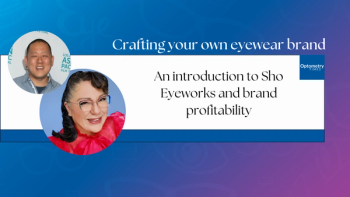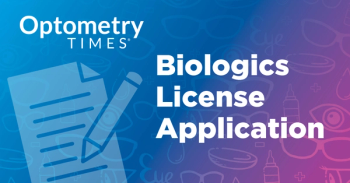
3 steps to success in clinical practice
So, in optometry, with online refractions, online sales of eyeglasses and contact lenses, and in the face of reduced insurance reimbursements, is true practice autonomy attainable?
I'm often dismayed by the negativity that is disseminated on social media not only within our esteemed profession, but also by other healthcare professionals.
I was reminded of this while reading Dr. Ernie Bowling’s editorial, “
In his editorial, Dr. Bowling quotes cardiologist and author Sandeep Jauhar, MD, from the book Doctored when he asks, “What kind of doctor do you want to be?”
I found this question unbelievably thought-provoking. In an era where many healthcare providers feel more like cogs in a wheel than independent professionals, this question is vitally important.
Related:
So, in optometry, with online refractions, online sales of eyeglasses and contact lenses, and in the face of reduced insurance reimbursements, is true practice autonomy attainable?
The answer is yes. But the question is how?
Know your why
You have to develop the reasons why before you determine how.
Most recent graduates are focused on getting a job, opening a practice, earning a high-end living, or some variation. The truth is it takes much more effort to establish what you want from your chosen profession than it does to prosper from it.
So what’s the secret to practice independence?
Focus.
There is one immutable truth: Every time you say yes to something, you’re saying no to something else. It’s that simple.
Most of us suffer from varying degrees of attention deficit disorder; our focus continually changes from one area of our practice to another. For some of us it is contact lenses, for others it is dry eye, eyeglasses, orthokeratology, vision therapy, or medical optometry. For our surgical colleagues it may be specialty intraocular lenses (IOL), LASIK, anti-VEGF injections, or expanding the number of locations from which they practice in order to cultivate more procedures.
If you don't know what’s most important, then everything seems important.
Related:
What has become universally accepted is the misconception that in order to be successful in health care you must enroll in several insurance plans and become proficient in coding and billing. This, in my opinion, is simply the wrong focus.
A better focus would be to reassess why you became an optometrist in the first place and on what values you made that decision. Once you understand the values that make you tick as a provider (values, when fulfilled, result in a feeling of passion and pure enjoyment), you can begin to design a practice that provides freedom and true independence.
What works in my practice
I practice with two other ODs. We have worked hard to figure out our why and what works for us.
Here are our three steps to success in clinical practice:
• Focus on a specialty that has a high barrier to entry
• Confirm that specialty is profitable
• Confirm that specialty fulfills your needs as a healthcare provider
Orthokeratology and vision therapy meet all three criteria for our practice. How?
• Most eyecare providers will not engage in these subspecialties
• Both subspecialties are profitable when fees are properly orchestrated
• Both fulfill our personal values of appreciation by improving the well-being of our patients
You’ve heard the term “jack of all trades, master of none.” In our office, we struggle on a daily basis to sustain our focus on these two subspecialties because daily urgencies call for our attention.
Related:
The soft lens reps tell us their one-day lenses are the best. Our colleagues tell us specialty IOLs helped them back to profitability. Others tell us purchasing equipment is profitable because it’s reimbursable. You get the picture: Focus requires discipline.
The challenge in growing an independent practice comes down to two criteria:
• Knowing why you’re growing a particular subspecialty
• Having the grit to say “no” to subspecialties that are disguised as opportunities
My partners and I have developed a successful practice because it was created to fulfill our individual values in life. The first step was defining those values; the second step was selecting just a few profit centers to grow and prosper. Even though we started as a multidisciplinary practice, we grew into a practice that offers a select few subspecialties extraordinarily well.
So, what does grit have to do with success? It may be the best predictor of success in a person’s life, according to Dr. Angela Lee Duckworth, professor of psychology at the University of Pennsylvania. Grit is the ability to pursue a long-term goal with passion and perseverance over the long haul.2
This relates to orthokeratology, vision therapy, or any other subspecialty because success in developing any particular area of your office requires grit, sustained focus, and the ability to say “no” to many subspecialties you’re currently engaged in within your practice.
Keep the focus
Success comes to those who have learned to focus on centers within their offices that bring them closer to what matters most to them in life. If you choose to focus on all centers, you’re choosing to be mediocre at best.
This sounds easy, but it’s not. In fact, it’s exceedingly difficult. That is why some ODs change subspecialties once they encounter a slow period rather than tough it out. They change their focus toward a different profit center. This only dilutes their efforts and diminishes the reward-not to mention frustrates the staff and confuses patients.
If it was easy, everyone would take the time to define what is most important in their lives and have the courage, or grit, to make their practices produce the outcome they desire.
Related:
Our success comes from sustained focus on subspecialties that make sense for our office. That means possessing the courage to drop all eyeglass plans, dropping the majority of healthcare insurance plans, and having the grit to sustain us through the ups and downs we encounter within our selected subspecialties.
It hasn’t been easy, but it has been rewarding. I challenge you to decide to focus upon why you established your practice in the first place and then analyze if your current practice modality brings you closer to actualizing your goals in life. If not, take the time to redefine your life’s mission and have the courage to say “no” to things that detract you from them and say “yes” to the decisions which bring you closer.
Practice independence is simple, but it is not easy. It requires drawing a line in the sand and not backing down. This metaphoric line is drawn after taking into account what you value most in life and expressing those values through the relationship you establish with your patients and by the subspecialties you provide.
Perhaps some healthcare providers are outwardly angry because their current modes of practice may not be in alignment with their governing values in life and they don’t have the grit to do something about it. I hope our experience has served as paradigm of a new way to look at practice independence.
References
1. Bowling E. What “Doctored” can teach us about optometry. Optometry Times. Available at:
2. Duckworth A. Grit: The Power of Passion and Perseverance. Scribner. 2016. Print.
Newsletter
Want more insights like this? Subscribe to Optometry Times and get clinical pearls and practice tips delivered straight to your inbox.













































